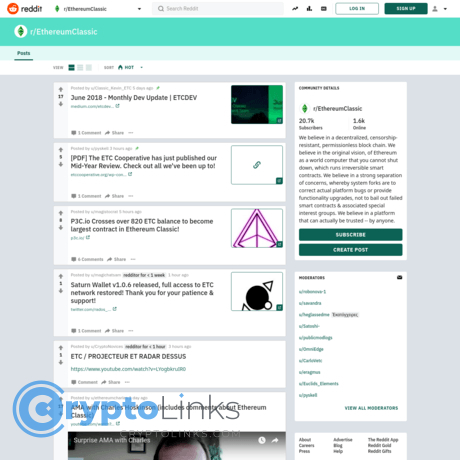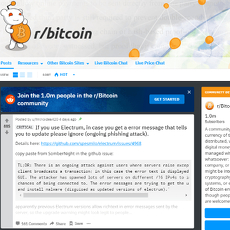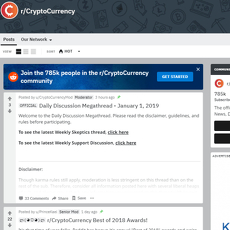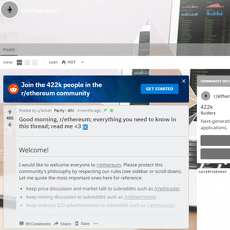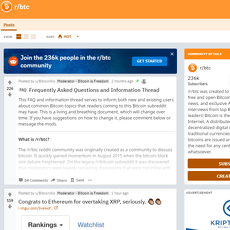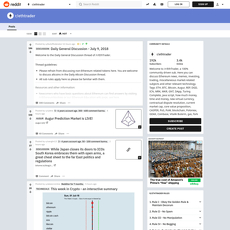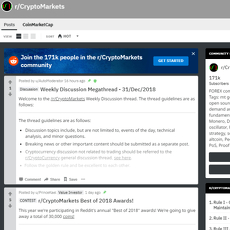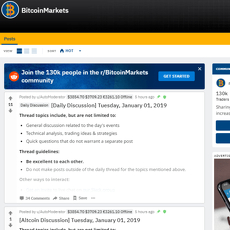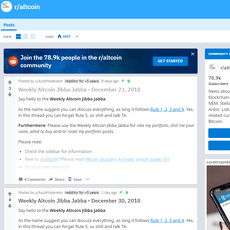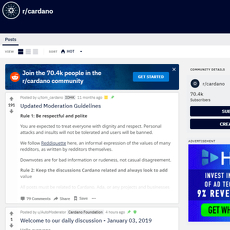r/EthereumClassic Review
r/EthereumClassic
www.reddit.com
r/EthereumClassic Review Guide: How to Use the Subreddit Without Wasting Time
Ever hit r/EthereumClassic, scroll for five minutes, and think: “Is any of this actually useful?” If you care about ETC—whether you hold it, mine it, build on it, or just keep an eye on it—this guide shows you how to get real signal fast and skip the noise.
I live inside crypto communities daily so you don’t have to. The trick isn’t reading more—it’s filtering better. Let’s make the subreddit work for you instead of the other way around.
Why r/EthereumClassic can feel noisy (and how it wastes your time)
The subreddit mixes smart technical content with repetitive chatter, and if you don’t know where to look, you’ll miss the good stuff. Here’s what trips most people up:
- Price posts drowning everything else: You’ll see the same “ETC to $X?” posts on repeat, usually with no data.
- Endless ETH vs ETC arguments: Philosophy debates have their place, but they bury practical updates.
- Mixed-quality advice: One thread recommends a reliable node client; another pushes a sketchy wallet you shouldn’t touch.
- Outdated info: Old mining tutorials or node guides surface via upvotes and keep circulating long after versions change.
- Risky links: Phishing airdrops, fake support accounts, “send 1, get 2 back” nonsense—yes, still a thing.
If you’ve searched “core-geth error” and landed in a price debate, you know the feeling. This isn’t your fault; it’s a classic information-overload problem. UX research backs this up: people work faster and make better choices when content is structured and scannable (Nielsen Norman Group on information foraging). On Reddit, that means using flairs, smart sorting, and the right threads—not just browsing the front page.
“The goal isn’t to read everything, it’s to find the right 10%—fast.”
What you’ll get from this guide
Short version: a system. I’ll show you exactly how to navigate the sub without wasting hours:
- Which sort options surface real value (and when to use each)
- Which flairs matter so you can zero in on tech updates, security notes, and mining info
- The recurring threads that concentrate useful conversation and reduce shilling
- The moderation rules that quietly trip people up and get posts removed
- How to spot credible contributors vs. loud, brand-new accounts
- A quick ETC primer so the arguments and dev updates actually make sense
- A practical FAQ that answers what everyone asks about ETC without the hype
Why this matters: Reddit can be a solid source of niche, high-signal info when you know how to filter it. A lot of people use Reddit for news and research precisely because of its niche communities (Pew Research Center), but you need a plan to avoid the echo chamber.
Who this is for
- New ETC holders who want context without a week of reading
- Miners moving rigs and comparing profitability/tools post-merge
- Developers curious about PoW EVM, clients, and node hygiene
- Market watchers who hate fluff and want signal
What you’ll learn
- How the community works and where the best info actually lives
- How to avoid scams and spot weak claims fast
- How to post in a way that doesn’t get auto-removed
- What to expect from ETC talk: the good, the hype, and the red flags
Quick take (TL;DR)
- Yes, r/EthereumClassic can be useful—if you filter it right.
- Use flairs, search, and weekly threads to find real updates and reduce noise.
- Bookmark core resources and prefer posts linking to client repos or official docs.
- Treat bold price claims as opinions unless there’s clear data and sources.
Ready to skip the fluff and get straight to the signal? Up next, I’ll show you what r/EthereumClassic actually is, who hangs out there, the vibe, and the rules that matter—so you don’t get blindsided on your first post. Curious how it stacks up against r/ethereum and other ETC channels? That’s coming too.
What r/EthereumClassic is and who hangs out there
r/EthereumClassic is the home base for people who care about the Ethereum Classic network and the philosophy that powers it: immutability, Proof-of-Work, and minimal governance. You’ll see real network updates, client releases, miner chatter, and the recurring debates that make ETC unique. It’s not the loudest crypto subreddit, but it’s one of the most opinionated—and that’s part of the value.
“Code is law” isn’t just a slogan here—it’s the filter the community uses to judge every proposal, upgrade, and hot take.
Who shows up here?
- OG ETC holders who stuck around for the long game and care about chain integrity.
- Miners tuning rigs, comparing hash/watt, and tracking profitability after Ethereum’s move to PoS.
- Developers and node operators watching client releases, testnet notes, and consensus changes.
- Curious ETH users trying to understand the ETC worldview and what “immutability-first” means in practice.
- Traders and market watchers who want signal without the meme flood.
Community snapshot: size, vibe, and rules
It’s a mid-sized subreddit—think tens of thousands of subscribers—with a steady flow of posts and comment activity that spikes around client updates, network incidents, and exchange notices. The vibe leans tech-first and principled, with room for price talk when it’s kept in its lane.
What stands out is the culture: people here are skeptical of quick fixes and emotional pitches. If you come in with a grand claim and no sources, expect pushback. If you bring logs, release notes, or benchmark data, you’ll get thoughtful replies.
Typical moderation lines you’ll notice:
- No spam or referral links. Promotions get axed fast.
- Keep price posts in designated threads. Standalone “what’s the price tomorrow?” posts get removed.
- No scammy giveaways or “send 1 ETC, get 2” schemes. Zero tolerance.
- Low-effort and off-topic posts are filtered to keep the feed usable.
- Source your claims. GitHub, explorers, reputable docs—opinions are fine, but evidence is better.
From watching the cadence for years, the sub tends to have calmer weekdays with a handful of solid posts, and surges when there’s a release, a testnet event, or a security discussion (especially when hash rate shifts make headlines). Post-incident threads often include links to explorers, client changelogs, and analysis—useful for anyone running infrastructure.
Common post types you’ll see
The content mix tilts practical and network-oriented. Expect threads like:
- Client and protocol updates: “Core-geth x.x.x release,” “Mordor testnet upgrade date,” “Consensus note on ECIP-xxx.” These usually link to release notes and include upgrade steps and known issues.
- Node and sync help: “Stuck at block 15,xxx,xxx,” “Peer count drops on Ubuntu,” “Best snapshot sources.” Replies often include flags, configs, or commit references.
- Mining and hardware talk: “NVIDIA vs AMD settings for ETC,” “Hash/watt targets after driver update,” “Pool variance experiences.” Screenshots of miner dashboards are common.
- Wallet and key management: “Ledger/MetaMask path for ETC,” “Restoring legacy ETC addresses,” “Safe RPC endpoints.” Community pushes for hardware wallets and official downloads.
- Ecosystem and infra news: “New explorer endpoint,” “RPC provider maintenance window,” “Exchange deposit/withdrawal status.” Useful for people who move funds or run services.
- Security discussions: “51% attack cost modeling,” “Checkpointing pros/cons,” “Monitoring orphan rates.” After the 2020 incidents, these posts tend to be grounded in data rather than fear.
- Philosophy and governance: “What immutability means,” “Why PoW matters,” “ETC vs ETH culture.” High-signal when long-time contributors weigh in.
- Market threads: Usually corralled into daily/weekly posts—sentiment checks, levels people are watching, and longer-cycle takes.
Every so often, heated debates flare up—especially around security budgets and miner incentives. They’re worth reading because they reveal how ETC trade-offs are handled in the open.
How it compares to r/ethereum and other ETC channels
Versus r/ethereum:
- Smaller, more focused: Less DeFi/NFT noise, more core protocol, mining, and philosophy.
- Different priorities: ETC threads stress immutability and PoW economics; r/ethereum often centers on staking, rollups, and application layers.
- Fewer research/EIP meta threads, more hands-on ops: sync issues, client flags, and upgrade paths.
Versus other ETC channels:
- Discord: Faster back-and-forth with devs and operators, but context gets buried. Great for real-time help; weak for long-term discoverability.
- Telegram: Quick pings and miner chats, but high noise and higher scam risk. Good for instant updates, not for sourced references.
- X (Twitter): Fastest announcements and sentiment snapshots; threads disappear in a day. Use it to spot news, then look for Reddit or GitHub links for the details.
- GitHub: Highest signal for code and specs—pull requests, issues, and release notes. No price chat, just work. Pair it with Reddit to get community interpretation and practical fixes.
- Official hub: ethereumclassic.org for canonical info; Reddit threads often expand on those updates with ops reality.
Think of Reddit as the searchable community layer: you get real-world context, war stories, and links to the authoritative sources without wading through a thousand memes.
So here’s the real question: if you only have 10 minutes, how do you surface the most useful ETC posts without getting stuck in price chatter or déjà vu debates? The next part lays out the exact sorting, search, and flair filters to get straight to the good stuff—want the setup I use every week?
Navigation: get value fast without scrolling for days
I’m allergic to wasted clicks. If I hit r/EthereumClassic and the first screen is price memes and recycled ETH vs ETC takes, I know I’m using the wrong filters. Here’s how I cut through the noise and get to the good stuff in under two minutes.
“Filter ruthlessly. In crypto, attention is your scarcest asset—guard it like your keys.”
Smart sorting and search tricks
Reddit’s default “Hot” feed buries technical signal under engagement bait. I switch views depending on the job:
- Top → This Month/This Year: Great for evergreen tutorials, post-mortems, and high-signal dev explainers that stood the test of time.
- New: Best for breaking changes, fresh client releases, or outage reports. I use it when I’m troubleshooting.
- Search with operators: Narrow results to exactly what you need. Type these into the sub’s search box:
- flair_name:"Development" Core-Geth — surfaces client updates and ECIP work tied to Core-Geth.
- flair_name:"Security" 51% attack — pulls debates and mitigation threads when risk chatter ramps.
- title:"release" flair_name:"Announcements" — finds official announcements and version notes.
- author:KnownDevName ECIP — checks a maintainer’s posts about proposals or specs.
- Backup with Google when Reddit search is flaky:
- site:reddit.com/r/EthereumClassic "Core-Geth" "invalid header" — real-world error strings beat vague guesses.
- site:reddit.com/r/EthereumClassic Besu ETC config — quick path to node config discussions.
Why the obsession with sorting? Eye-tracking research from Nielsen Norman Group shows most people scan in an F-pattern, skimming headings and the first lines while missing deeper content. Using Top and targeted search places the highest-value items where your eyes naturally land—saving time and reducing context switching. Source: NN/g.
Flairs and recurring threads that matter
I treat flairs like filters on a Bloomberg terminal—click them to isolate what you care about, then bookmark the filtered URL.
- Development: ECIPs, client changes, and protocol notes. Expect links to ECIPs, Core-Geth, and occasionally Hyperledger Besu issues.
- Security: Discussions on hashrate trends, reorg analysis, and risk modeling. Good context before acting on hot takes.
- Mining: Profitability threads, pool health, DAG/Etchash quirks, and tuning tips for rigs after driver updates.
- Announcements: Releases, network notices, and event updates. Less debate, more facts.
Recurring threads reduce noise and pull good comments into one place:
- Weekly Discussion/Price Thread: Markets, sentiment checks, and quick Q&A without clogging the front page.
- Support/Megathreads (when active): Great for “is it just me?” node sync issues or wallet hiccups after an update.
My quick routine: open Top this month in one tab, New in another, then filter by Development. That’s 80% of the value in 90 seconds.
Posting etiquette to avoid removals
Mods are generally fair but strict about low-effort posts and referral spam. If you want help fast—or want your post to survive—use this simple template:
- Title: Be specific. “Core-Geth 1.12 failing at block X on Ubuntu 22.04” beats “Node broken, help.”
- Environment: Client + version, OS, hardware, and whether you used a snapshot or full sync.
- Steps to reproduce: Bullet your steps; include the exact command you ran.
- Error/logs: Paste the exact error string; link longer logs via Gist or Pastebin.
- What you tried: Show initiative—peers respond faster when you’ve tested obvious fixes.
- Links: Prefer official docs, ECIPs, and GitHub issues over random blogs or YouTube.
Two things that get nuked fast: referral links and off-topic price posts outside the weekly thread. Keep those out, and your post will live.
Spot the signal: who to trust
In a smaller subreddit, credible voices stand out if you know the tells. Here’s my checklist before I act on a post or comment:
- Source-backed: Mentions ECIP numbers, links to GitHub PRs/issues, or cites release notes. If someone explains a consensus change without a link, I wait.
- Reproducible detail: Error strings, block heights, client flags. Vague “it broke” posts get a pass.
- Track record: Click the profile. Do they consistently help with nodes, mining, or security topics? Or are they fresh accounts pushing grand predictions?
- Cross-verification: I check explorers and repos when claims are big. Example flow:
- Claim: “New Core-Geth release fixes X.”
- Verify: See it on Core-Geth releases and a matching Announcements flair post.
- No urgency sales pitch: Time pressure, guaranteed returns, or “DM me for support” is an instant red flag.
I also save comments from a handful of steady contributors who consistently cite primary sources. Over time, your saved list becomes a custom feed of high-signal voices.
One more pro tip: when a thread heats up with opinions, sort comments by Top and then by Old. Top gives you consensus; Old shows the first responders (often the folks closest to the incident or release).
You can learn to move fast here without breaking things—but only if you know where the traps are. Would you spot a fake “official support” DM in under 3 seconds? If that question makes you pause, you’ll want to read what’s next.
Safety first: scams, red flags, and ETC-specific risks
I’ve seen every trick in the book show up under crypto posts. The scammers don’t care if you’re a veteran or brand-new—they just want your keys, your clicks, or your coins. Treat every thread like a potential attack surface and you’ll keep more of what’s yours.
“Slow is smooth, smooth is fast.” If a post makes you rush, it’s probably pushing you toward a mistake.
Common subreddit scams
Same playbook, different wrappers. On ETC discussions you’ll run into:
- Fake “support” DMs: A helpful stranger says they’re from Ledger, MetaMask, or an exchange and asks you to “verify” your seed, share a screen, or install a tool. Real support never cold-DMs you.
- Phishing airdrops: Flashy “claim” sites that ask you to connect a wallet and sign. Many use drainer kits—research from ScamSniffer estimates wallet drainers stole hundreds of millions in 2023 alone.
- “Send 1 ETC, get 2 ETC back” giveaways: Classic doubling scam. It’s never real. The FTC reports that since 2021, consumers have reported over a billion dollars lost to crypto scams—giveaways are a big slice.
- Malware wallets and “patched” clients: A random GitHub or file-share link promising faster syncs or mining boosts. You run the binary, it runs your balance to zero.
- Recovery hustles: “I can get your stuck ETC back—DM me.” Nobody can recover funds from a chain transaction. These folks will ask for fees up front or your seed phrase.
Golden rule: never move funds, share a seed, or sign unknown transactions because of a Reddit post or DM. If it’s legit, it can wait while you verify it.
Ethereum Classic risk reality check
ETC is Proof-of-Work and EVM-compatible, but its smaller network makes security debates louder and sometimes more urgent. That context matters when you read hot takes:
- 51% attacks are a real, historical risk for ETC: The chain experienced multiple reorganizations in 2019–2020. Mitigations like MESS were introduced, and hashrate rose after ETH’s Merge, but risk isn’t zero on any PoW chain with modest hashrate.
- Exchanges can react fast: During past incidents, some exchanges raised ETC confirmation requirements into the thousands to manage risk. If a thread mentions delays or “wallets under maintenance,” it might be a security posture, not a conspiracy.
- How to read security claims:
- Ask for sources: client release notes, explorer links, or exchange status pages.
- Check hashrate and pool distribution via reputable trackers before forming an opinion.
- Look for consensus from maintainers or recognized contributors, not just screenshots.
Data helps. Chainalysis’ crime reports show scams ebb and flow with market cycles, but technical risks don’t care about sentiment. Keep both in mind when a post feels sensational. Sources: Chainalysis Reports.
Security basics for tools and links
When in doubt, shrink your attack surface. My baseline checklist:
- Verify URLs character by character. Bookmark official sites. Watch for subtle typos like “classlc” vs “classic.”
- Prefer hardware wallets (Ledger, Trezor) and never store seeds in cloud notes or screenshots. If it touches the internet, assume it’s public.
- Download from official GitHub orgs only, and verify signatures or checksums on releases. No binaries from random comments—ever.
- Use a clean browser profile for crypto with minimal extensions. Extensions are a top phishing vector.
- Confirm contract addresses via trusted explorers like Blockscout (ETC Mainnet) before sending or interacting. Cross-check in at least two places.
- Keep approvals lean. If you interact with tokens on ETC, regularly revoke unused approvals using a reputable revoker tool you trust.
- Cold path for big moves: prepare transactions offline, sign on hardware, and broadcast from a separate device. Slow beats sorry.
One more habit I love: set a 24-hour rule for any risky action. If the opportunity can’t survive a day of due diligence, it wasn’t good to begin with.
Red flags in threads
Pattern recognition saves time and money. I nuke these on sight:
- No sources, just hype: “Huge upgrade live now!” with zero links to client repos or org announcements.
- Urgency and scarcity: “Only 30 minutes left to claim.” Scarcity is a feature of scams, not good information.
- Guaranteed returns: “Daily 3% APR safe.” Markets don’t guarantee anything.
- Off-platform “support”: “Chat me on Telegram for help.” Real support doesn’t ask you to switch platforms privately.
- Brand-new accounts with big claims and aggressive DMs after you comment.
Green flags that increase my trust:
- Links to GitHub commits, release notes, and explorers with transaction IDs or block numbers.
- Specifics over vibes: exact client versions, error logs, and reproducible steps.
- Known maintainers and long-time contributors whose histories check out.
Quick stat to keep your guard up: the FTC notes social media is the top contact method in reported crypto scam losses, and Reddit threads are part of that funnel. Treat comments like they were handed to you in a dark alley. Verify or ignore.
I’ve got one simple mantra that’s saved me more than once: Don’t click. Don’t connect. Don’t confirm. Not until you’ve checked the source, the signatures, and the story. Now, if you’ve ever wondered why there are two Ethereums at all—and how that history shapes ETC’s security culture—want the short, no-nonsense origin story next?
Quick ETC primer so subreddit chatter makes sense
ETC vs ETH: why two chains exist
In 2016, a smart contract called The DAO was exploited for roughly 3.6 million ETH. The Ethereum community split on what to do next. One side chose to rewrite history to return the funds, creating what we now call Ethereum (ETH). The other side refused to change finalized chain history, keeping the original chain—Ethereum Classic (ETC).
That decision hardwired a culture. ETC’s ethos centers on immutability: if a transaction is valid under the protocol, it stands. You’ll feel this in comment threads whenever someone suggests “fixing” the chain retroactively. It’s not about being stubborn; it’s about the predictable rules that make permissionless systems trustworthy.
“Code is law.” In ETC circles, that isn’t a slogan — it’s a boundary.
If you’re new, this is why you’ll see strong moderation against calls to “roll back” or “freeze” anything. The community’s identity was forged in that fork.
PoW, mining, and network security trade-offs
ETC stayed Proof‑of‑Work. That means miners compete to add blocks, and the cost to attack the chain is tied to real hardware and electricity. It also means security tracks miner incentives and total hash rate.
- Algorithm: ETC uses Etchash (a variant of Ethash). The Thanos upgrade extended DAG limits so older GPUs could mine again, improving miner diversity.
- Hash rate matters: Higher hash rate raises the cost to attack. After Ethereum’s Merge in 2022, ETC’s hash rate spiked as ex‑ETH miners pointed rigs at ETC—good for security, but it fluctuates with price and miner profitability.
- 51% attack history: ETC has faced deep reorgs before (2019 and multiple events in 2020). Coinbase’s analysis of an ETC reorg offers a clear view of how attacks look in practice (source). Tools like Crypto51 estimate theoretical attack costs across PoW chains, useful for context (estimates change with market conditions).
- Miner economics: Revenue = block rewards + fees. ETC’s “5M20” schedule reduces block rewards by 20% every ~5 million blocks (ECIP‑1017), so long‑term security leans more on price, fees, and efficient miners.
- Practical tip: When you see threads about exchange confirmations or reorg depth, this is why. Exchanges may require extra confirmations if hash rate drops or volatility spikes.
Academic work backs this security framing: the economic cost to rewrite history under PoW scales with hash power and time, aligning with results from Budish’s “The Economic Limits of the Blockchain” (NBER). It’s not perfect security, but it’s expensive security.
Tools, wallets, explorers, and dev hubs
Threads on r/EthereumClassic constantly reference a core toolkit. Here’s the short list you’ll actually use:
- Full nodes / clients
- Core‑geth (actively maintained): github.com/ethereumclassic/core-geth
- Erigon (ETC forks exist; check maintenance status): etclabscore/erigon (readme/status before using)
- Hyperledger Besu (can be configured for ETC networks): besu.hyperledger.org
- Network status: etcnodes.org
- Explorers
- Blockscout (ETC mainnet): blockscout.com/etc/mainnet
- Blockchair: blockchair.com/ethereum-classic
- OKLink: oklink.com/etc
- Wallets
- Hardware: Ledger Live and Trezor Suite support ETC natively (Ledger list, Trezor list)
- Software: Trust Wallet, Exodus, Guarda
- MetaMask: works by adding ETC as a custom network (Chain ID 61). Double‑check RPC URL and explorer settings before sending funds.
- RPC providers
- Chainstack, Ankr, GetBlock, NOWNodes, and community endpoints (e.g., Ethercluster) often come up. Always verify uptime and rate limits before production use.
- Docs and governance
- Knowledge base and developer docs: ethereumclassic.org
- ECIPs (standards and upgrades): ecips.ethereumclassic.org
- ETC Cooperative (ecosystem support): etccooperative.org
- Testnets you’ll see referenced: Mordor (PoW) and Kotti (PoA)
Quick sanity check you’ll see me repeat in comments: only download binaries from the project’s official GitHub/org, verify signatures when provided, and avoid “patched” clients posted in comments.
Price talk reality check
ETC trades like a classic altcoin: long quiet stretches, fast upside during risk‑on phases, and brutal drawdowns. In 2021, ETC ripped to an all‑time high above $170 before retracing heavily (chart). In 2022, the Merge narrative briefly pulled miners and attention back, and price followed—attention and liquidity still matter a lot.
- Cycles dominate: Correlation with broader alt seasons is high, especially when BTC volatility compresses then expands.
- Expect variance: 70–90% drawdowns have happened—plan position sizes like an adult.
- On-chain vs narrative: Hash rate, client stability, and exchange support can move sentiment, but headlines often move faster than fundamentals.
- Forecasts are opinions: Treat “guaranteed targets” as red flags. Backtests and risk budgets beat hopium.
I look at price threads as sentiment checks, not signals. If you want actual signal, pair community notes with neutral datasets from Messari or Coin Metrics and keep an eye on hash rate charts from reputable mining dashboards.
Want straight answers on the questions everyone asks—Is ETC a good long-term play, what could go wrong, and how far can price really go? That’s where we’re headed next.
FAQ: straight answers to what everyone asks about ETC and the subreddit
Is Ethereum Classic a good long-term investment?
I treat ETC as a high-beta, high-risk asset with spikes in momentum around broader crypto cycles. Historically it’s moved hardest when liquidity rotates into altcoins, and it’s underperformed during periods when attention and capital concentrate on BTC and ETH.
- What’s the upside case? It’s a Proof-of-Work, EVM-compatible chain with periodic interest from miners and traders. It captured significant hashpower right after Ethereum’s Merge and has staged sharp, short-lived rallies around that kind of narrative.
- What’s the reality check? Developer funding is smaller than on ETH, the app ecosystem is leaner, and network effects are weaker. Without persistent usage growth, rallies tend to fade.
- What I do: I size ETC as a speculative slice only, assume high volatility, and avoid leverage. None of this is investment advice—just common-sense risk management.
Personal rule: if I wouldn’t be comfortable holding it through a full bear cycle, I don’t size it big.
Is there a future for Ethereum Classic?
Yes, but it’s path-dependent. The durable future for ETC rests on three pillars:
- Security: More distributed, sustained hashpower and mature node/client diversity. After Ethereum moved to PoS, ETC’s hash rate rose as miners migrated. That helped, but consistency matters more than one-off spikes.
- Developer activity: Regular protocol upgrades and client maintenance keep it compatible and safe. ETC has historically tracked many ETH opcodes via upgrades (e.g., Atlantis, Agharta, Phoenix, Magneto, Mystique), which helps tooling work cross-chain.
- Usage: Practical on-chain activity—payments, settlement for PoW-aligned apps, or niche EVM workloads that prefer immutability-first culture.
Conservative scenarios look like steady, modest growth tied to maintenance and occasional narratives. Wild projections demand real catalysts: new killer apps, sticky liquidity, and stronger network effects.
Can Ethereum Classic reach $5,000?
Extremely unlikely under today’s fundamentals. Do the simple math:
- Market cap check: With a hard cap around ~210M ETC over time, $5,000 implies a market cap well north of $700B (and likely closer to $1T depending on circulating supply at the time). That would require ETC to compete directly with BTC and ETH for global capital—without comparable adoption or developer mindshare right now.
- Liquidity reality: Order books and on-chain liquidity would need a step-change. Without it, even getting part-way there would be structurally hard.
I focus on realistic ranges and catalysts I can actually track: security metrics, client releases, exchange support, and recurring user activity. Moon targets sound fun, but I prefer signals I can verify.
What are the major risks with ETC?
- 51% attack risk: ETC has suffered multiple reorganizations and attacks in the past (notably in 2020). Smaller PoW networks are inherently more exposed when hashpower is rentable, and exchanges will respond by raising confirmation requirements. This is the right lens for heated security debates you’ll see on the subreddit.
- Funding and maintenance: Fewer full-time teams means slower iteration and a narrower app ecosystem. If client maintenance ever stalls, that’s a red flag.
- Liquidity and listings: Some regions and venues are cautious with ETC; listing status and confirmation windows can change after incidents. Always check exchange notices before moving funds.
- User security: The usual crypto hazards apply: fake support, phishing airdrops, malware wallets, and “too good to be true” returns. On Reddit, assume unsolicited DMs are scams.
Practical habits: use hardware wallets, verify every URL, prefer official client releases, and wait extra confirmations for large transfers—especially during network turbulence.
Best places to research ETC outside Reddit
I keep a living list of primary sources you can bookmark here: ETC research resources.
- Client repos: Releases, upgrade notes, and security advisories tell you what’s actually shipping.
- Block explorers: Check chain health, gas, large transfers, and contract interactions to see real activity.
- Protocol docs and ECIPs: Understand what changed and why; it’s the best way to decode technical threads on the sub.
- Neutral data dashboards: Hash rate, miner economics, exchange volumes, and correlation stats add useful context to price chatter.
Tip: When a spicy claim hits the subreddit, look for a link to a client release, ECIP, or explorer data. If it’s not there, treat it as a rumor until proven.
Want to see the exact routine I use each week to separate real signals from noise—and the settings I save so it only takes 10 minutes? That’s next. Ready for a step-by-step plan you can copy?
My playbook: how I use r/EthereumClassic (and how you can too)
I keep r/EthereumClassic useful by treating it like a signal feed, not a lounge. Here’s the exact routine that keeps me informed, cuts the noise, and helps me catch real changes early—without scrolling my life away.
My workflow
I run a tight weekly loop that takes 20–30 minutes:
- Monday (10 minutes)
- Sort by Top → This Week and Top → This Month for the highest-quality posts. Reddit’s own docs confirm that Top surfaces the most upvoted content in a timeframe, which tends to filter out low-effort noise.
See how sorting works.
- Filter by flairs I care about: Development, Security, Mining, Announcements.
- Run two quick searches:
- flair:"Development" core-geth release (I open the latest and jump to the GitHub link to confirm.)
- flair:"Security" 51% (I scan for any credible incident chatter or mitigation notes.)
- Open client/version alerts and cross-check with official repos:
- Core-Geth releases: github.com/etclabscore/core-geth/releases
- ETC GitHub org overview: github.com/ethereumclassic
- Sort by Top → This Week and Top → This Month for the highest-quality posts. Reddit’s own docs confirm that Top surfaces the most upvoted content in a timeframe, which tends to filter out low-effort noise.
- Wednesday (5–10 minutes)
- Open the current Weekly Discussion thread and sort comments by Top or Best. This thread concentrates insights and usually includes quick fixes, config notes, and good off-site links.
- Hit Save on comments from trusted contributors so I can build a personal “shortlist” of authors to check every week.
- Friday (5–10 minutes)
- Scan New for breaking changes people might have missed.
- Verify any big claim with a source before I act—especially security or upgrade news. If there’s a new binary, I look for a signed release on GitHub and a matching checksum.
- Note any exchange status mentions (deposits/withdrawals paused or resumed) and confirm on the exchange’s page:
- Binance status: binance.com/en/support/announcement
- Kraken status: status.kraken.com
- Coinbase status: status.coinbase.com
Rule I live by: “Trust, but verify.” If it’s not linked to an official repo, credible explorer, or known maintainer, I assume it’s unverified.
Why the fuss? Because scammers love social platforms. The U.S. Federal Trade Commission reported that people lost over $1 billion to crypto scams from 2021 to 2022 alone. Treat DMs and “support” links as hostile until proven safe.
Source: FTC data spotlight.
Your action plan for week one
Set up once, benefit every week:
- Subscribe and tap the bell for Occasional notifications so you don’t miss pinned posts or alerts.
- Read the rules in the sidebar. If you ever need tech help, include your client version, OS, logs, and exact error text. Mods remove low-detail posts fast.
- Follow the flairs you care about. Use the subreddit’s flair filter (top of the feed) and toggle Development, Security, Mining, and Announcements.
- Bookmark the weekly thread when it appears. That’s the best place to ask questions without getting flagged for low effort.
- Build a clean link stack you’ll reuse:
- Nodes and client stats: etcnodes.org
- Explorer: blockscout.com/etc/mainnet
- Core-Geth releases: Core-Geth Releases
- Network hashrate and pools: miningpoolstats.stream/ethereumclassic
- Community hub (official links/Discord): ethereumclassic.org/community
- Neutral asset research: Messari: Ethereum Classic
- Lock in safety: bookmark known-good domains, use a hardware wallet, and never install binaries shared in comments. Download from official GitHub releases only.
- Optional power-ups:
- RSS for low-noise monitoring: /r/EthereumClassic RSS
- Reddit Enhancement Suite filters to mute keywords you don’t care about (e.g., “giveaway”): redditenhancementsuite.com
By the end of week one, you’ll have a tuned feed, a trustworthy resource list, and a workflow that surfaces the good stuff automatically.
Good complements to this subreddit
When something big hits the sub, I confirm it here:
- GitHub orgs and repos
- Ethereum Classic org: github.com/ethereumclassic
- Core-Geth: github.com/etclabscore/core-geth
- Explorers and network health
- Blockscout ETC: blockscout.com/etc/mainnet
- ETC Nodes: etcnodes.org
- Mining pool distribution and hashrate: miningpoolstats.stream/ethereumclassic
- Maintainers and announcements
- Client maintainers and ETC org accounts on X (Twitter) for release and incident notes. Start from the links at
ethereumclassic.org/community.
- Client maintainers and ETC org accounts on X (Twitter) for release and incident notes. Start from the links at
- Exchange status pages (useful during network events)
- Binance: Announcements
- Kraken: status.kraken.com
- Coinbase: status.coinbase.com
I also keep a tiny checklist in my notes app: “Explorer OK? Node/client update? Exchange status? Any credible security alerts?” It turns a messy scroll into a fast systems check.
Wrapping up
Used right, r/EthereumClassic is a sharp tool. Sort by Top in short windows, lean on flairs, save posts from reliable contributors, and verify everything through official repos and explorers. Keep your keys safe, treat DMs as hostile by default, and remember:
Good info compounds when you filter it. Hype fades fast. Facts don’t.
Set your routine once and the subreddit becomes a steady source of signal—not another tab that steals your time. Nothing here is investment advice; it’s just a smarter way to research without the noise.

